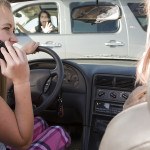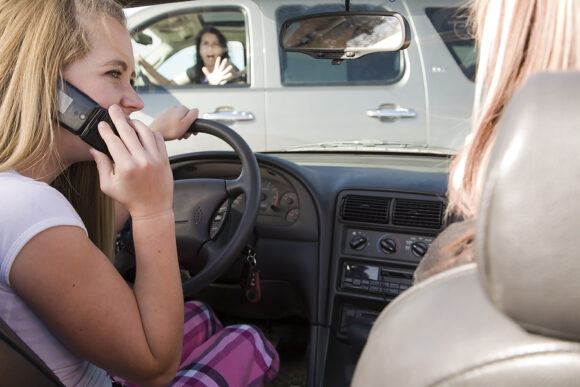Drivers are faced with a number of distractions today. Consider that more than 587,000 people driving at any given time are holding cell phones, according to a National Occupant Protection Use Survey conducted in 2014.
According to Distraction.gov, a joint website run by the National Highway Traffic Safety Administration and the U.S. Department of Transportation, 3,179 people were killed and 431,000 were injured in motor vehicle crashes involving distracted drivers in 2014.
The Centers for Disease Control and Prevention (CDC) outline three areas of driver distraction:
- Visual: taking your eyes off the road;
- Manual: taking your hands off the wheel; and
- Cognitive: taking your mind off of driving.
The CDC states the main distractions facing today’s drivers include:
- Texting;
- Using a cell phone or smartphone;
- Eating and drinking;
- Talking to passengers;
- Grooming,
- Reading, including maps;
- Using a navigation system;
- Watching a video;
- Adjusting a radio, CD player or MP3 player.
Selfies, public displays of affection and grooming topped Erie Insurance’s 2015 distracted driving survey. Respondents reported doing all sorts of crazy things while driving, including brushing teeth and changing clothes. Nearly a third of drivers reportedly texted while driving with 75 percent admitting they had witnessed other drivers texting.
As of April 2016, 14 states and Washington D.C., Puerto Rico, Guam and the U.S. Virgin Islands prohibit anyone from using hand-held cell phones while driving, according to the Governors Highway Safety Association (GHSA). In addition, 38 states and Washington D.C. ban all cell phone use by novice drivers, while 20 states and Washington D.C. prohibit school bus drivers from using cell phones while on duty.
According to the GHSA notes that 46 states, Washington D.C., Puerto Rico, Guam and the U.S. Virgin Islands ban all drivers from texting. Cellphone use laws while driving can be viewed on the GHSA website: http://www.ghsa.org/html/stateinfo/laws/cellphone_laws.html
Since April is distracted driving month, the federal government and individual states are working to combat the problem with public awareness campaigns.
National Transportation Safety Board Chairman Christopher Hart kicked off Distracted Driving Awareness Month and California Teen Safety Driving Week at press conference in California recently. He called on California to be first state to ban use of all personal electronic devices while driving.
“Behind every distracted driving death is a story of loss. In the blink of an eye, lives can be transformed forever,” said U.S. Transportation Secretary Anthony Foxx. “Scrolling through song lists on a cell phone, or texting while driving is not just irresponsible, it can have tragic consequences. We’re calling on drivers to put down their devices and help keep the roadways safe for all Americans.”
According to data from the California Highway Patrol (CHP), 22,365 people were involved in distracted driving collisions in 2014.
“As we rely on our cell phones more and more in our everyday lives, we seem to be kidding ourselves in thinking that they don’t affect our driving,” said California Office of Traffic Safety Director Rhonda Craft. “Crashes are up. The scientific evidence is solid. The dangers are real, and they apply to all of us. We need to silence the distractions.”
 A 2014 study by the American Automobile Association Foundation for Traffic Safety found that cell phone distraction is much more prevalent than is reported in official government statistics.
A 2014 study by the American Automobile Association Foundation for Traffic Safety found that cell phone distraction is much more prevalent than is reported in official government statistics.
“Our investigators can determine if speed, alcohol, or drugs were a factor in a collision,” CHP Commissioner Joe Farrow said. “However, it is difficult to determine when distracted driving is the cause. Most people do not declare that they were distracted before they crashed. Therefore, we know distracted driving statistics are underreported.”
The Florida Department of Highway Safety and Motor Vehicles (DHSMV) is partnering with the Florida Department of Transportation, Florida Sheriffs Association, Florida Police Chiefs Association, Florida SADD and the Florida Teen Safe Driving Coalition to address the problem.
“Operating a motor vehicle is a tremendous responsibility which requires a driver’s full attention,” said DHSMV Executive Director Terry L. Rhodes. “The department is reminding drivers of all ages to keep your hands on the wheel, your eyes on the road and your mind on driving.”
In 2015, more than 45,700 distracted driving crashes in Florida resulted in an estimated 39,000 injuries as well as 200 fatalities. Distracted driving crashes accounted for 12.2 percent of all crashes in Florida last year, 7.4 percent of fatal crashes and 15.4 percent of all injury crashes, according to statistics provided by the Florida Highway Patrol, which reported working about 43 percent of distracted driving crashes statewide.
“Distracted driving is extremely risky behavior that not only puts drivers and passengers in danger, but others out on the road as well,” said Colonel Gene Spaulding, Director of the Florida Highway Patrol.
In Colorado, of the 203,827 motorists involved in a crash in 2013, an estimated 24.4 percent of those crashes were attributed to distracted drivers and between 2008 and 2013, there was a nine percent increase in the number of crashes caused by distracted driving in the state.
Besides federal and state government public awareness campaigns, insurers are working to raise distracted driving awareness.
Allstate offers its Reality Rides driving simulator to better educate people about the dangers of distracted driving. Allstate polled participants before using the simulator to better understand their knowledge and beliefs relating to distracted driving. More than 6000 motorists were polled between 2013 and 2015. The poll resulted in some revealing statistics:
- 1 in 3 drivers acknowledged they sometimes text and drive.
- More than 63 percent talk on the phone while driving.
- Almost 35 percent were either involved or knew of someone involved in a distracted driving related accident.
Travelers partnered with the Connecticut Department of Motor Vehicles this year for its 8th Annual Teen Safe Driving Contest. The winners were announced in February created videos based on the theme “When Shifting into Drive, Keep the Safety of Others in Mind!”
“These videos continue to send very powerful and persuasive messages to all drivers about the dangers of distracted driving. In its eighth year, the DMV-Travelers Teen Safe Driving Video Contest creates a significant impact on our young drivers,” said Attorney General George Jepsen.
Winning schools shared in a $15,000 cash prize and as well as other prizes and gifts donated to students and high schools by Travelers.
Some feel that auto manufacturers are partly to blame for the increase in distractions facing drivers today.
Joe DeLago, CEO of Good2Go Auto Insurance Company issued written pleas to CEOs of American auto manufacturers to eliminate technological distractions from all new vehicles sold. DeLago argues that automakers are actually encouraging distracted driving by creating dashboards with smartphone features and Wi-Fi capability.
“As manufacturers continue to cater to millennials, they’re adding more and more technology to vehicles. These connected vehicles are drawing drivers away from the ultimate task, driving,” DeLago said. “Auto manufacturers need to eliminate distractions rather than adding to the problem.”
Was this article valuable?
Here are more articles you may enjoy.


 Elon Musk Alone Can’t Explain Tesla’s Owner Exodus
Elon Musk Alone Can’t Explain Tesla’s Owner Exodus  China Bans Hidden Car Door Handles in World-First Safety Policy
China Bans Hidden Car Door Handles in World-First Safety Policy  Hackers Hit Sensitive Targets in 37 Nations in Spying Plot
Hackers Hit Sensitive Targets in 37 Nations in Spying Plot  One out of 10 Cars Sold in Europe Is Now Made by a Chinese Brand
One out of 10 Cars Sold in Europe Is Now Made by a Chinese Brand 